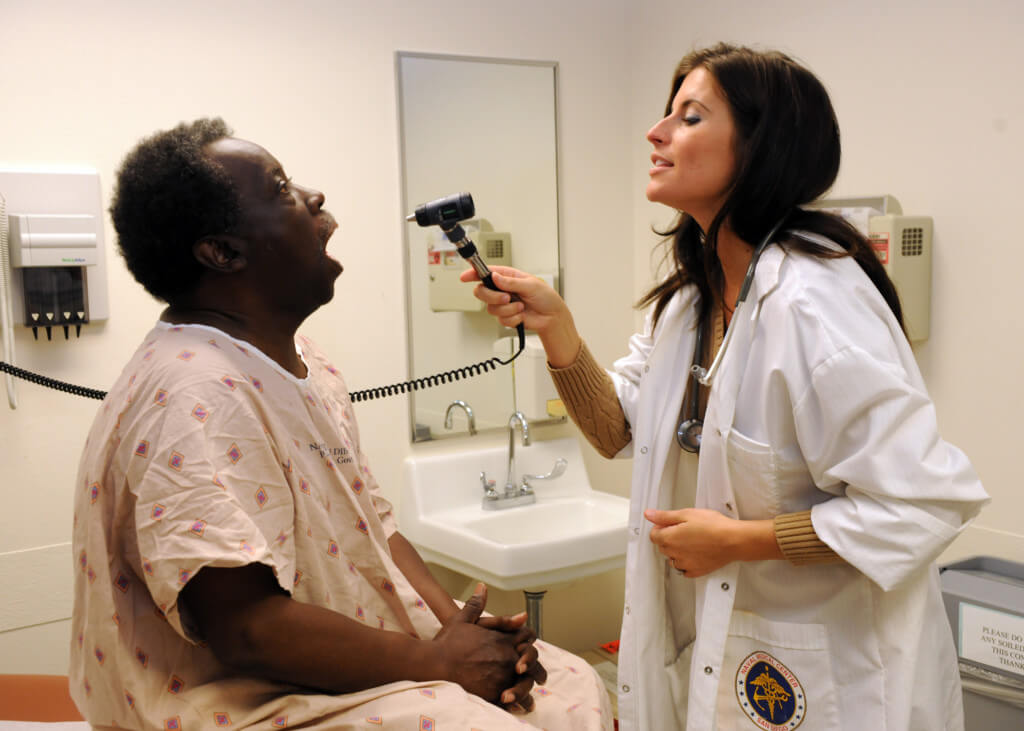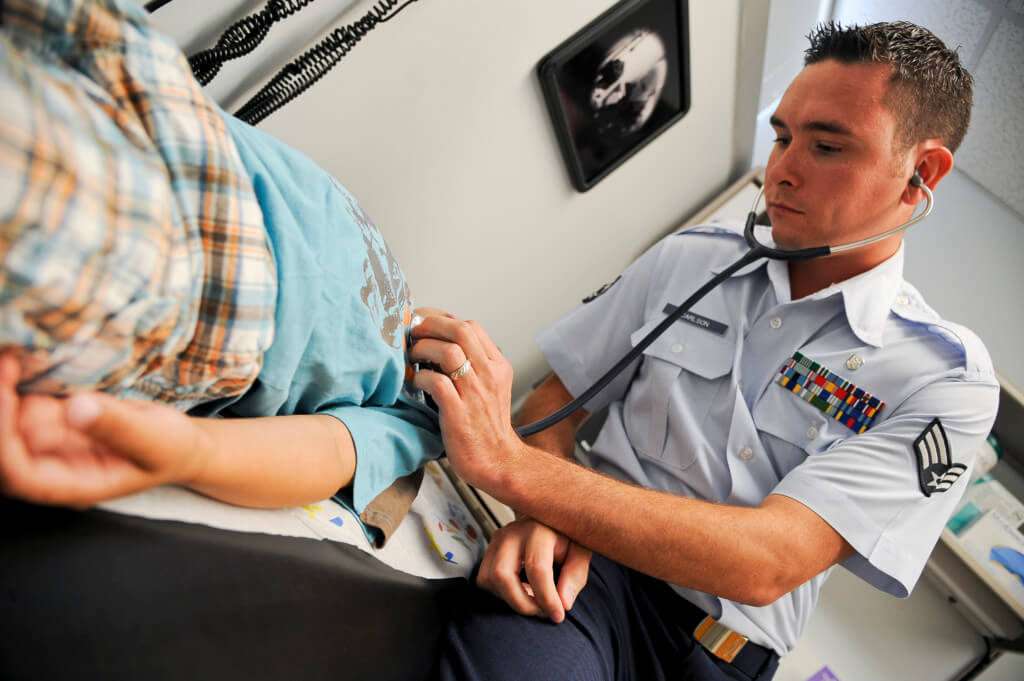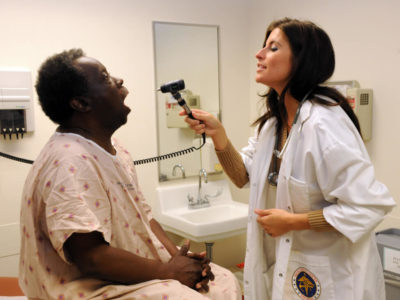Interested in saving lives without going to medical school? Becoming a nurse practitioner may be the job for you. However, don’t assume nurse practitioners do less work. Assuming a nurse practitioner role requires you to work under just as rigorous and precise conditions as medical doctors. As a licensed nurse practitioner, your extensive education and ample experience allow you to provide higher levels of care and perform more advanced tasks than a registered nurse (RN).
Keep reading to find out how to become a nurse practitioner.
What does a Nurse Practitioner Do?

Your days will never grow dull. A myriad of activities will routinely pack your schedule. Nurse practitioners:
- Perform physical assessments
- Diagnose illnesses
- Order and analyze diagnostic tests
- Manage patient treatment
- Prescribe medications in certain scenarios.
What does it take to become a Nurse Practitioner?

Get ready to hit the books, hard. To become a nurse practitioner, you need to get educated and your path can go a few ways. You’ll have to start by earning your credentials as a registered nurse (RN). Most aspiring nurses earn their associate’s or bachelor’s degree from an accredited university or receive their diploma from a certified vocational training program. Some collegiate programs offer an accelerated track, allowing you to complete your RN credentials and bachelor’s degree simultaneously.
However, enrolling in a Bachelor of Science in Nursing (BSN) program remains the fastest track to a nursing career. These programs often prove competitive for undergraduates. The BSN application process can feel strangely like déjà vu, as you submit your transcript and resume like applying to college all over again. Because BSN programs function under high selectivity, be sure to present yourself as well- rounded in both academics and extracurriculars. Even the rare breed of 4.0 GPA students get frequently rejected. Additionally, the BSN program requires multiple pre-requisites in anatomy, physiology, chemistry, microbiology and nutrition, a nightmare course load for left brainers. Upon completing the program, you must pass a standardized national examination (NCLEX-RN) and obtain a state license to officially become an RN.
After receiving your RN certification, your nurse practioner pursuit barrels on into graduate school. Potential candidates must earn at least a Master of Science in Nursing (MSN). Before grad school, you may opt to take a break from the books and work a few years as a devoted RN. This is the point in your healthcare career where all bodily squeamishness goes to die. Many graduate schools only accept students with a few years of nursing experience, while others allow applicants to pursue their MSN while accumulating RN work experience. Whichever path you choose, real-world RN experience proves essential in facilitating your career as a nurse practitioner. It exposes you to areas of potential future specialties. You can also choose to earn your DNP (Doctor of Nursing Practice degree), as experts in the health field note a growing trend of NPs earning their Ph.D.
If you weren’t a coffee drinker during undergrad, you will be in grad school. Graduate programs conduct in-depth, intensive studies of medical ethics, diagnosis and anatomy. The curriculum for a potential NP follows the general course of study for an advanced practice registered nurse (APRN) in tandem with specialized NP education and training. Nursing graduates engage in hands-on, clinical training as well as receiving a fast-paced class room education. Coursework incorporates anatomy, physiology, pharmacology, pediatrics, gerontology and healthcare management. At the graduate level, students typically select a field specialty. Options include family and primary care, women’s health, psychiatry or geriatrics. If pursing your MSN, prepare for 18 to 24 months of intensive study. If pursuing your DNP, buckle down for two to three years of additional schooling.
What should you know about becoming a Nurse Practitioner?

1. What is my expected income?
Expect to earn big bucks for your commitment to healthcare and saving lives. On average, a licensed nurse practitioner makes about $103,407 a year. That means you can look forward to an annual salary ranging from $80,000 to $130,000.
2. How much will I work?
The time you spend working depends on your specialty or site, like if you work in a hospital or private office. Some nurse practioners choose not to work in specialties and therefore do not work on call. “I work in a private practice in Dermatology that does not require being on call. Scheduling usually is full time with salary-based hours. Basically, your day ends when your work ends, but that can be highly variable,” said Lilian Gonzalez, a nurse practitioner at Flores Dermatology based in Miami, Florida. For some NP’s, especially if you work in a hospital, the job requires brutal hours. People in need of healthcare remains a nonstop necessity. “Because of the demands of the job, you can end up feeling drained emotionally and physically. It’s important to have good relationships with your colleagues who can help you through the rough times. Self-care is also important. Make sure you treat yourself well, so you don’t end up feeling burned out,” said nurse practitioner Kimberly Garruto Morgan.
3. What will my work environment be like?
You will either work in a hospital, clinic, or private practice. Most often, nurse practioners will see their own work load of patients in addition to assisting other practitioners with their patients as needed. A nurse practitioner remains responsible for call backs and reviewing pathology and lab results, too. “An NP’s work environment is most likely similar to the physician she works for/with. Tight schedules, seeing many patients. A new practitioner may have an easier schedule for the first week, two weeks or even a month, but will have to be productive or won’t be cost effective for the practice. Environments obviously depend on the specialty as well. Procedures will be scheduled differently. NPs will not have a lot of down time,” said nurse practitioner Elizabeth Stein.
4. What do I need to know about the future of the profession?
The future for nurse practitioners looks bright. As long as humans remain made of flesh and bone , the need for healthcare professionals will stay in demand. “I absolutely envision an evolving role for NPs. More and more each day, patients are more knowledgeable about NPs and what role we play in their medical management. Patients are more accepting and satisfied with the care from their NP,” Gonzalez said.
3 Key Skills You Need to Become a Nurse Practitioner

1. Perseverance
As a potential future nurse practitioner, you’ll embark on an extremely difficult and demanding certification process. The need for perseverance persists as a no-brainer if you hope to overcome the challenges on this career path. “Knowledge matters. Know your stuff. You need to be able to teach patients, medical assistants and more about what you are diagnosing, medications you are ordering, how and when to take them, potential side effects and how they should work in their body,” said Stein. If you stick with the process and never give up, what you now consider your dream job can become a very possible reality.
2. Adaptability
Whether you work in a hospital, clinic or someone’s home, administering medical care remains an unpredictable environment. Patients may come in deathly sick and fall into your care. People injured in major accidents may rush through the doors and you’ll have to jump in. Further, you’ll experience consistent pressure and must learn how to manage it and adapt to urgent situations. “You have to develop a thick skin. People’s lives become your responsibility. It’s important to not lose your composure,” said Gonzalez.
3. Passion
If you become a nurse practitioner for money alone, you likely won’t stick with it. If you want to become an nurse practitioner, take a step back and ask yourself why. Your passion in caring for others should motivate you to get up every morning and do your job. “Saving lives” often seems like a dramatic catchphrase in Grey’s Anatomy, but it exists as a very real and serious occupation.
Reviews
“The job is tough. There are elements you just can’t prepare for. The added responsibility of making sole decisions for your patients is one. People place an enormous trust in you to help them. The ability to overcome instead of acting negatively toward a situation is essential in staying composed. If you worked previously as an RN, you were under the leadership of another. As an NP, you take over that position of leadership and you must constantly show by example with a positive attitude,” Gonzalez said.
“Going from a RN to an ARNP requires internal growth. Nurses take orders. NP’s give orders to everyone they work with. This has to become internalized. Additionally, the differences between NP’s and MD’s are lessening. MD education focuses on pathology whereas (in theory) NP focus is on wellness and total body health. The truth though for NP’s is a careful balance of both, and MD’s are rethinking their intense focus on pathology only. Health, wellness and total body lifestyle are increasing on everyone’s radar screen,” Stein said.
“To make it as a nurse practitioner, you need to keep up on the literature. Medicine is constantly changing, and you need to be well versed on the latest treatments and also the existing treatments. Patients are very savvy these days and often do a lot of research before stepping into your office. Patients will look to their nurse practitioner to educate them on their illness and treatments so it’s important to keep on top of that. Additionally, with the high volume of patients now typically seen, the nurse practitioner needs to be able to work in a fast-paced environment, but yet slow down when seeing each patient, and give that person your full attention,” said Morgan.



















